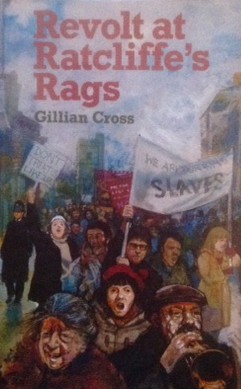Inspiring Young Readers
 posted on 07 Feb 2018
posted on 07 Feb 2018
Revolt at Ratcliffe’s Rags by Gillian Cross
Award winning novelist, Gillian Cross might be best known to a more recent generation of young readers for her Demon Headmaster series of books that were turned into a television series. This 1980 publication, however, comes from quite a different place taking, as it does, the issue of industrial strife as its main theme.
It may be hard for anyone under thirty to remember a time when trade unionism still had meaning in the public political debate and the rights of the workforce were still a matter for serious concern and discussion. The miners’ strike was still four or five years away when this book was published and the trade unions were, at times, the only effective and legitimate opposition to a government, headed by Margaret Thatcher, that was just about to launch its ideological assault on the whole Labour Movement.
The neoliberal consensus that has dominated the political debate over the years since then may have dulled the memory to just how visceral and confrontational attitudes could be when it came to industrial relations during these years. Both sides of the workplace divide, management and shop-floor, felt they were in a fight for something significant.
And it’s this sense of a battle for something more than just pay and self-interest that Gillian Cross is trying to introduce to younger readers who might find it hard to engage with class struggle at a more theoretical or dialogic level. In Revolt At Ratcliffe’s Rags three children – Abigail, Chris and Susan – take on a seemingly innocuous homework assignment and unwittingly find themselves drawn into a life-changing dispute and involved in a strike that introduces them to the complexities of the adult world.
But it’s not Cross’ intention to write a simple polemic about the exploited workers in the clothing factory being badly done-by and the machinations of a ruthless unfeeling boss who stands and twirls his metaphorical moustache as he gloats over their travails. Instead we have quite an ambivalent, nuanced story in which right can be found on both sides and in which the emotional complexities of a dispute like this are genuinely explored.
All of the children learn important lessons and grow in their understanding of these complexities and from starting out as very different, even antagonistic towards each other, they change to grow together. That’s not to say they become great friends as result but each child changes significantly – growing in confidence, learning humility or just coming to understand the value of plain common sense.
The experiences of the workers in the factory are also described without sentimentality and although the fairness of the case is clear to see, at the same time, there is a genuine attempt to explain the attitude of the factory owner who built his business from scratch and the consequences of the actions the workforce take.
The book does a good job in describing the way strikes develop a momentum and direction of their own. Every time the children try and do something with the very best of intentions they encounter the law of unintended consequences and they are once again thrown onto the back foot.
The end of the book tries to mix realism with optimism. The result of the workers strike means that everyone will have to rethink their futures and the three children have learned a lesson that they could never have uncovered in the classroom.
The need to give the book dramatic power does lead Gillian Cross to make a couple of fundamental errors about trade unionism and fall back on some stereotypes that are perhaps less than ideal. There is no attempt to talk about the role of a trade union or trade union recognition in the workplace and at the end the description of the ‘mass picket’ falls back on the old canard that all such actions are inevitably violent and involve an uncontrollable mob.
Despite that, the book has plenty in it to involve the young reader and to get them talking about issues of exploitation and fairness in the workplace. Not too many young adult books do that in my experience and even though this may now have a somewhat dated feel to it, the issues it deals with are timeless and universal.
Terry Potter
February 2018